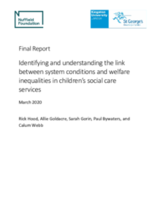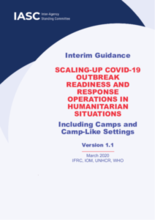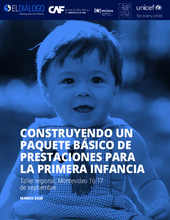Demographic Data
|
Sources: World Bank, UNICEF, UNDP HDR 2015, DHS 2014/2015 |
Displaying 4591 - 4600 of 14348
If the United States adopted a child allowance, says this brief from the Center for the Study of Social Policy, it would ensure that families with children always have a minimum income on which they can rely, whatever the circumstances.
This report presents the findings from a study of the organisational and institutional context of statutory children’s social care (CSC) in England and its contribution to inequalities in provision.
This issue brief provides an overview of U.S. national protective factors approaches to prevent child abuse and neglect.
This report presents findings from an independent analysis of the responses to a public consultation issued by the Scottish Government in September 2019, which invited views on its specific proposals for the establishment of a statutory financial redress scheme for victims / survivors of abuse in care.
In this article journalist Mykeala Campanini explores why a majority of children in out-of-home care (OOHC) in Australia are struggling to reach national literacy and numeracy benchmarks, which puts them at risk of becoming disengaged with schooling, resulting in lifelong disadvantage.
This Interim Guidance addresses specific needs and considerations required in humanitarian situations, including camps and camp-like settings and the surrounding host communities, in scaling-up readiness and response operations for the COVID-19 outbreak through effective multi-sectoral partnership.
El Diálogo Interamericano y UNICEF han conformado una alianza orientada a fortalecer la construcción y la implementación de políticas integrales de la primera infancia basada en evidencia, en los países de la región. En esa línea, se convocó un Taller regional en Uruguay. Este documento presenta los principales elementos destacados y discutidos en la reunión y los aspectos en los cuales hay un mayor acuerdo entre los expertos participantes del taller.
This guidance note is intended to support child guidance for remote child protection case management, including the key child protection principles of survival and development, non-discrimination and inclusion, child participation, and the best interest of the child.
This special issue of the Institutionalised Children Explorations and Beyond journal, guest-edited by Delia Pop, Tessa Boudrie and Mark Riley of Hope and Homes for Children, focuses on deinstitutionalization in South Asia.
This technical note calls for Protection from Sexual Exploitation and Abuse (PSEA) to be integrated into the response to COVID-19.








